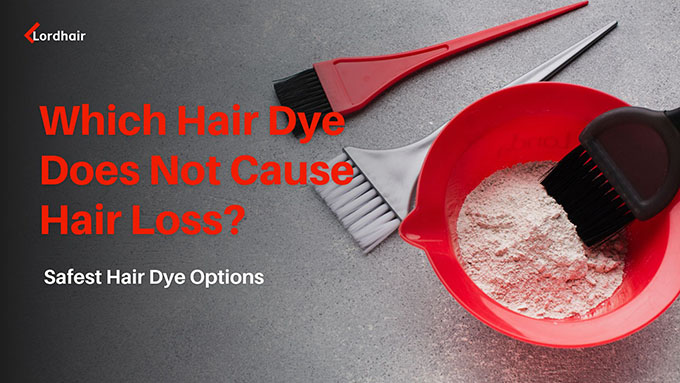Medications That Cause Hair Loss: Complete List 2022
- Written by Ray Fernandez
- Feb 10, 2022
- |
- 728 min read
 Listen to the full text
Listen to the full textThere are many reasons behind hair loss in men and women. Genes, hormonal changes, and aging are some of the most common ones. But there is another reason that’s slowly making a bigger impact on hair health worldwide. We are talking about medications. Yes, you read it right! Medications used for treating specific conditions could trigger mild or aggressive hair loss as a side effect.
In this blog, Lordhair will share a list of medications that cause hair loss in men and women. We will also share recommendations to recover from drug-induced hair fall. Since some of you might be in a hurry to learn about the different medications that cause hair loss, here’s a FAQ version of the blog!
What are medications that cause hair loss?
The following medications are infamous for triggering hair loss and thinning:
-
Amphetamine
-
Antidepressants
-
Cimetidine
-
Minoxidil
-
Birth control pills
-
Antibiotics
-
Weight loss drugs
-
Finasteride
How to prevent hair loss from medications?
In order to prevent hair loss caused by medications, you can:
-
Ask trichologist about an alternate solution
-
Go for hair strengthening diet and routine
-
Wear a hair replacement system if hair loss is aggressive
Is it possible to recover from hair loss caused by medications?
Yes, it's possible to recover from medication triggered hair loss
Now that we are done with the TL;DR version, let’s dig deeper into different types of medications that cause hair loss.
Which Medications Cause Hair Loss?
Here’s the list of medications that cause hair loss:
Amphetamine
Amphetamine is a central nervous system (CNS) stimulant that is often prescribed as performance enhancement and works by speeding up the messages traveling between the brain and body. Amphetamine comes in multiple forms - powder, tablets, and capsules.
Doctors also prescribe this psychostimulant drug for treating conditions like Attention Deficit Hyperactivity Disorder (ADHD) and Narcolepsy (a chronic sleep disorder pertaining to extreme daytime laziness and sudden attacks of sleep). Acne, blurred vision, seizures, and heart problems are some of the popular side effects of using Amphetamine. Hair loss though is a lesser-known side effect.
Although not everyone is affected, people around the world have reported hair shedding after getting on this medication. According to medical experts, hair loss triggered by this medication can occur all over the scalp rather than being limited to a particular area.
Antidepressants
Antidepressants are used for treating clinical depression in adults. They help with mood swings, improve sleep quality, and boost appetite. Antidepressants balance chemicals in your brain (better known as neurotransmitters) that affect mood and emotions. While doing all that, this medication can cause hair loss in men and women as well.
People who are on antidepressants like Prozac, Paxil, Zoloft, and Sertraline typically become victims of a hair loss condition called telogen effluvium. Some cases of anagen effluvium have also been reported amongst users.
Cimetidine
For those who don’t know, cimetidine is a medication used to treat ulcers - a sore on mucous membranes such as the lining of your stomach and intestines. Taken orally, cimetidine also helps in treating certain stomach and throat problems caused by stomach acids or a backward flow of stomach acid into the esophagus.
Cimetidine can also be used to seize DHT receptors on the follicles. This helps in holding back the hair follicles from miniaturizing. However, overusing this medication can also make your hair loss condition worse. A lot of people have reported sudden hair loss after a few weeks of using Cimetidine.
Minoxidil
We simply can’t negate the popularity of minoxidil as a hair recovery option. It is a topical medication used to stimulate hair growth in men and women suffering from hair loss problems. Available in both liquid and foam, minoxidil increases blood flow to the hair by dilating the blood vessels in the scalp. But do you know the same medication can also make hair loss worse?
Yes, aggravated hair loss is one of the highly touted side effects of minoxidil. What’s more, it can also trigger acne at the site of application and cause inflammation at the root of the hair.
Learn about all the side effects of minoxidil
Birth control pills
Most common medications have their share of side effects and birth control pills are no different. This medication can cause hair loss in women who are sensitive to the hormones in the pill - estrogen, and progesterone (man-made forms of the female hormones) or those who have a family history of androgenic alopecia.
The hair growth cycle has three phases - anagen (growing phase), catagen (regressing phase), and telogen (resting phase). Birth control pills could shift your hair strands from the growing phase to the resting phase too early. The result? Women start noticing large amounts of broken strands while combing their hair or taking a bath.
Antibiotics
Another medication that can cause hair loss in men and women. Antibiotics are drugs that are meant for neutralizing bad bacteria in the human body. But their course of action is desultory, meaning, they may affect all the bacteria, be it good or bad. And because of this reason, antibiotics sometimes make it harder for your body to synthesize nutrients from the B complex (say vitamins B1, B2, B3, B5, B6, B7, B9, and B12).
Without vitamin B, your hair falls out and has a hard time growing. Although it is really difficult to identify antibiotics that could cause hair loss, the common ones are penicillin, cephalexin, and erythromycin
Weight loss drugs
We all know that weight loss drugs taken over a long period of time pack many side effects but do you know they can also trigger hair loss? Yes, weight loss pills can impact your hair.
The type of hair loss caused by weight loss drugs is mostly telogen effluvium. Hair damage usually takes place due to nutrient deficiencies. Thankfully, hair loss caused by weight loss medications is usually temporary. Meaning, your strands will grow back once you fill up the dietary gaps.
Finasteride
Finasteride is highly used by men to treat benign prostatic hyperplasia (BPH) and male pattern hair loss - androgenetic alopecia. Available in the form of tablets, this medication works by diminishing the level of Dihydrotestosterone (DHT) - a natural body hormone that is a derivative of testosterone and promotes hair growth.
However, this medication can also aggravate hair loss in some cases. That happens because hair follicles that were previously in the resting phase due to DHT become active and start to grow at a faster rate than normal - resulting in shedding.
Chemotherapy drugs
Okay, you are probably aware of the hair loss caused by chemotherapy but we still feel that our list will be incomplete without talking about it. Chemotherapy drugs are powerful medications that attack rapidly growing cancer cells.
Sadly, these medications also attack other rapidly growing cells in the human body including cells in our hair roots. Hair strands usually begin falling out 2-4 weeks after starting chemotherapy treatment. They can come out very quickly either in clumps or gradually. Read more about this
How to Prevent Hair Loss Triggered by Medications?
Men and women who recently started taking a new medication and noticed hair fall should immediately talk to the doctor and request a change in medication. While medications like chemotherapy drugs have no substitute, wearing premium medical wigs and hair systems can greatly help.
Lordhair designs and supplies the world’s best range of stock hair replacement systems for women and men. Known best for their breathability, durability, and hyper-realism, our non-surgical hair recovery products are shipped to more than 100 countries and come with a 30-day money-back warranty.
Watch how amazing Josh looks after wearing a hair piece toupee:
There you go!
We told you about different medications that cause hair loss in men and women.
Medications That Cause Hair Loss
Asking for a medication alternative from your doctor can greatly help recover from hair damage caused by certain medications. If that's not possible, adjust the dosage to ease symptoms of hair loss. Remember not to stop taking the medication without discussing it with your doctor.
If your hair loss has reached an extreme stage and there is no change of natural regrowth, we highly recommend wearing a hair replacement system. Got any queries to ask? Send them to support@lordhair.com and have them answered by our hair experts!
Also read:
Everything about thyroid hair loss
FUE vs. FUT hair transplant: What makes more sense in 2022?
Hair integration systems to recover from hair thinning
Types of hair wigs and products to fight baldness



